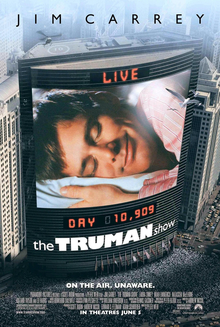
Back عرض ترومان Arabic ذا ترومان شو ARY ذا ترومان شو ARZ Trumanın şousu Azerbaijani Шоу Трумана Byelorussian Шоуто на Труман Bulgarian দ্য ট্রুম্যান শো Bengali/Bangla ཁྲོས་མིན་གྱི་འཇིག་རྟེན། Tibetan The Truman Show Catalan Truman Show Czech
| The Truman Show | |
|---|---|
 Theatrical release poster | |
| Directed by | Peter Weir |
| Written by | Andrew Niccol |
| Produced by |
|
| Starring | |
| Cinematography | Peter Biziou |
| Edited by | |
| Music by | |
Production company | |
| Distributed by | Paramount Pictures |
Release dates |
|
Running time | 103 minutes[1] |
| Country | United States |
| Language | English |
| Budget | $60 million |
| Box office | $264.1 million |
The Truman Show is a 1998 American psychological drama film[2] written and co-produced by Andrew Niccol, and directed by Peter Weir. The film depicts the story of Truman Burbank (played by Jim Carrey), a man who is unaware that he is living his entire life on a colossal soundstage, and that it is being filmed and broadcast as a reality television show which has a huge international following. All of his friends, family and members of his community are paid actors whose job it is to sustain the illusion and keep Truman unaware about the false world he inhabits.
The movie's supporting cast includes Laura Linney, Ed Harris, Noah Emmerich, Natascha McElhone, Holland Taylor, Paul Giamatti, and Brian Delate.
Niccol's original spec script was more of a science-fiction thriller, with the story set in New York City. Producer Scott Rudin purchased the script and set up production at Paramount Pictures. Brian De Palma was to direct before Weir signed as director, making the film for $60 million—$20 million less than the original estimate. Niccol rewrote the script while the crew was waiting for Carrey to sign. The majority of filming took place at Seaside, Florida, a master-planned community located in the Florida Panhandle.
The Truman Show held its world premiere in Los Angeles on June 1, 1998, and was released in North America on June 5. The film was a financial success, grossing $264 million worldwide, debuting to critical acclaim, and earned numerous nominations at the 71st Academy Awards, 56th Golden Globe Awards, 52nd British Academy Film Awards, and 25th Saturn Awards. The Truman Show has been analyzed as an exploration of simulated reality, existentialism, surveillance, metaphilosophy, privacy, and reality television, and described as a genre-blending work that features elements of dystopian fiction, meta fiction, psychological drama, romantic comedy, satire, and social science fiction.
- ^ "The Truman Show". British Board of Film Classification. Archived from the original on January 30, 2021. Retrieved December 27, 2015.
- ^ "The Truman Show (1998) - Peter Weir | Synopsis, Characteristics, Moods, Themes and Related". AllMovie. Archived from the original on April 20, 2021. Retrieved February 1, 2021.